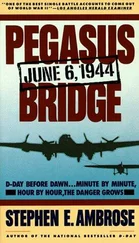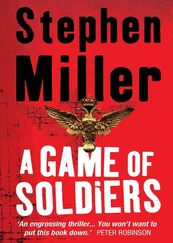Stephen Ambrose - Citizen Soldiers [Condensed]
Здесь есть возможность читать онлайн «Stephen Ambrose - Citizen Soldiers [Condensed]» весь текст электронной книги совершенно бесплатно (целиком полную версию без сокращений). В некоторых случаях можно слушать аудио, скачать через торрент в формате fb2 и присутствует краткое содержание. Жанр: История, на английском языке. Описание произведения, (предисловие) а так же отзывы посетителей доступны на портале библиотеки ЛибКат.
- Название:Citizen Soldiers [Condensed]
- Автор:
- Жанр:
- Год:неизвестен
- ISBN:нет данных
- Рейтинг книги:5 / 5. Голосов: 1
-
Избранное:Добавить в избранное
- Отзывы:
-
Ваша оценка:
- 100
- 1
- 2
- 3
- 4
- 5
Citizen Soldiers [Condensed]: краткое содержание, описание и аннотация
Предлагаем к чтению аннотацию, описание, краткое содержание или предисловие (зависит от того, что написал сам автор книги «Citizen Soldiers [Condensed]»). Если вы не нашли необходимую информацию о книге — напишите в комментариях, мы постараемся отыскать её.
Citizen Soldiers [Condensed] — читать онлайн бесплатно полную книгу (весь текст) целиком
Ниже представлен текст книги, разбитый по страницам. Система сохранения места последней прочитанной страницы, позволяет с удобством читать онлайн бесплатно книгу «Citizen Soldiers [Condensed]», без необходимости каждый раз заново искать на чём Вы остановились. Поставьте закладку, и сможете в любой момент перейти на страницу, на которой закончили чтение.
Интервал:
Закладка:
THE ENEMY was fighting with the desperation of a cornered, wounded animal. The German infantry was stretched thin. The frontline divisions were getting one replacement for every eleven casualties. By mid-July the Wehrmacht in Normandy had lost 117,000 men and received 10,000 replacements. For the Germans, rations and ammunition flows were adequate, if barely, but medical supplies were gone and artillery shells were severely limited.
Knowing that if the Americans broke through, there was nothing between them and the German border, so the Germans fought even harder. Rommel continued to direct the battle even as he went over and over in his mind a search for some way to convince Hitler to step aside so that the war could be concluded while Germany still had some conquered territory to bargain with (as in 1918) and before Germany herself was destroyed.
On July 16 Rommel sent Field Marshal Giinter von Kluge an ultimatum for Kluge to pass on to Hitler. It was a two-and-a-half-page document. Rommel opened by observing that the ultimate crisis was coming soon in Normandy. The American strength in tanks and artillery grew each day. Meanwhile, the Wehrmacht replacements who were arriving were inexperienced and poorly trained, which made them particularly likely to panic when the Jabos appeared. Rommel concluded: "It is necessary to draw the political conclusions from this situation." His aides argued that he should cross out the word political. He did, and signed.
The next day the Jabos got him. A British fighter shot up his staff car, and Rommel had a serious head injury. On July 20, a group of conspirators tried to kill Hitler. Rommel went home to recover. Three months later he was forced to commit suicide because of the assassination plot, even though he had not been directly involved.
The conspiracy and Hitler's retaliation against the officer corps put a severe strain on the German army, but, amazingly, it was not split asunder. Throughout the Nazi empire, from Italy to Norway, from Normandy to Ukraine, officers of the Wehrmacht did their duty despite the turmoil created by the assassination attempt. And they acceded to the demand made by the Nazi party that henceforth the salute would be given with an extended arm and a "Heil Hitler," rather than bringing the hand up to the cap brim.
Corporal Adolf Hohenstein of the German 276th Division later said that the enlisted men convinced themselves that shortages of supplies and ammunition were the fruits of treachery by their own officers. Actually, it was the Jabos. There is no evidence that during the Battle of Normandy any German officer gave less than his full ability to sustain the men in the line.
They needed it. Corporal Hohenstein watched morale ebb in his squad:
"The lack of any success at all affected the men very badly. You could feel the sheer fear growing. We would throw ourselves to the ground at the slightest sound, and many men were saying that we should never leave Normandy alive."
As if the Jabos were not effective enough as it was, the Americans were constantly improving their ground-to-air communications system. Solutions came because of Major General Elwood "Pete" Quesada, CO of Ninth Tactical Air Force, who went to Bradley to explore new methods. For example, Quesada said, artillery units have forward observers who radio target information to the gunners. Why don't we equip planes and artillery units with VHF radios so that they can spot for each other? They tried and it worked.
Why not put radio sets in tanks so the tankers could talk to the pilots? Quesada wondered. This too worked. So well, in fact, that by late July the radiomen on the ground could bring aircraft in as close as 500 metres. And it was an awesome amount of explosive a P-47 carried: two five-inch by four-foot missiles under each wing, plus two 500-pound bombs, plus 6400 rounds of .50-calibre shells.
Major Gerhard Lemcke of the 12th Panzer Division testified to the effectiveness of the American improvements in communication. "Whenever a German soldier fired his panzerfaust," Lemcke complained, "all of the American tanks, artillery, mortars, and planes in the area concentrated their fire upon him. They would keep it up until his position was pulverized."
The US Army air-ground team in ETO continued to improve through to the end of the war. Its communication system was vastly superior to anything the Germans ever developed. Meanwhile, the Eighth Air Force B-17s continued to pound targets in France, particularly bridges and railroads, as did the Marauders of Ninth Air Force. But through July, 50 per cent of the missions for all planes in England and France had to be scrapped due to weather.
On the ground the Americans continued to advance, slowly but all along the front, except at St. Lo, the key crossroads city in lower Normandy. Outside St. Lo the 29th Division had been locked in a mortal embrace with the German 352nd Division since D-Day. In each division there was scarcely a man present for duty who had been there on D-Day.
To the defence of St. Lo the Germans devoted much of their strength, as Major Randall Bryant discovered in mid-July when he was walking across an orchard with his closest friend, Captain Charles Minton, beside him. The Germans laid on a TOT-time on target-an artillery shoot carefully coordinated to concentrate the fire of an entire battery or regiment on one spot at a precise moment. Bryant and Minton happened to be at the spot.
"Suddenly everything was exploding," Bryant related. "There was blood all over me, and a helmet on the ground with a head inside it. It was Minton's. Three young second lieutenants had just joined us, straight from the beach and Fort Benning. I had told them to sit down and wait to be assigned to companies. They were dead, along with six others killed and thirty-three wounded in a shoot that lasted only a matter of seconds."
General Charles Gerhardt, the CO, was under great pressure from Bradley to take St. Lo. So far he had already lost more men outside St. Lo than he had on Omaha Beach on D-Day. The 29th's rifle companies were close to 100 per cent replacements. But Gerhardt figured the Germans were in worse condition and ordered a general assault to take St. Lo, putting all his strength into it.
Major Tom Howie, a mild-mannered teacher of English literature before the war, led the 3rd Battalion of the 116th Regiment. Linked to the 2nd Battalion, he was to drive right on into St. Lo. On July 17, an hour before dawn, the attack began. Howie limited each platoon to two men firing their rifles, and then only in emergency. The others were to use their bayonets and hand grenades. The idea was to achieve surprise, infiltrating by squads without artillery preparation.
In the predawn attack the infantry broke through or passed through the German line and took the high ground just one kilometre from St. Lo. The road into the city was open. Howie called the company commanders to a conference to give them their objectives. "We had just finished the meeting," Captain William Puntenney, Howie's executive officer, recalled. "The Germans began dropping a mortar barrage around our ears. Before taking cover in one of the foxholes. Major Howie turned to take a last look to be sure all his men had their heads down. Without warning, one of the shells hit a few yards away. A fragment struck the major in the back and pierced his lung. 'My God, I'm hit,' he murmured, and I saw he was bleeding at the mouth. As he fell, I caught him. He was dead in two minutes."
Captain Puntenney took over just as a counterattack from the Fallschirmjdger hit the battalion. Using the new communications techniques, the 29th called in artillery and a fighter-bomber strike. It broke up the attack, and the men began the charge into St. Lo.
As they crested the hill and started the descent into the town, the Americans were shocked by what they saw. St. Lo had been hit by B-17s on D-Day and every clear day thereafter. The place was a lifeless pile of rubble in which roads and sidewalks could scarcely be distinguished. As they moved into the fringe of town, they began to draw fire from some Fallschirmjdger in a cemetery. A macabre battle ensued, rifle and machine-gun bullets smashing into headstones. Rhino tanks came up through the hedgerows in support and drove the Germans off. The men of the 29th dashed into the town, guns blazing. There was still hard fighting to go before the town was completely cleared of the enemy, but * finally St. Lo was in American hands.
Читать дальшеИнтервал:
Закладка:
Похожие книги на «Citizen Soldiers [Condensed]»
Представляем Вашему вниманию похожие книги на «Citizen Soldiers [Condensed]» списком для выбора. Мы отобрали схожую по названию и смыслу литературу в надежде предоставить читателям больше вариантов отыскать новые, интересные, ещё непрочитанные произведения.
Обсуждение, отзывы о книге «Citizen Soldiers [Condensed]» и просто собственные мнения читателей. Оставьте ваши комментарии, напишите, что Вы думаете о произведении, его смысле или главных героях. Укажите что конкретно понравилось, а что нет, и почему Вы так считаете.
![Stephen Ambrose Citizen Soldiers [Condensed] обложка книги](/books/346737/stephen-ambrose-citizen-soldiers-condensed-cover.webp)








